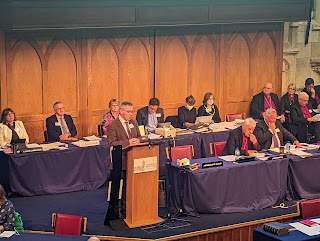Motion on climate change investment
Wonderful news! This motion was passed by Synod.
News: Climate Change and Fossil Fuels Motion Passed at General Synod: A motion calling on the RCB to ensure… https://t.co/7Mx6K5uhnn #coigs
— Church of Ireland (@churchofireland) May 5, 2017
Here is a copy of the motion that passed at General Synod 2017 in Limerick. For more details see the press release and tweet from the Church of Ireland press office. (Be sure to like and retweet!)
11. REPRESENTATIVE CHURCH BODY Proposer: Mr Stephen Trew
Seconder: Mr Kevin BowersExplanatory note
The RCB accepts the broad scientific consensus, as set out in the Intergovernmental Panel on Climate Change’s (IPCC’s) Fifth Assessment Report (2014), that greenhouse gas emissions from human activities are the most significant contributor to changes in the world’s climate. Urgent action is needed if we are to mitigate and adapt to the consequences of climate change on ecosystems, and on present and future generations.
The RCB acknowledges that climate change is a global issue and requires a response from companies, commercial enterprises, policymakers and society as a whole – individually, institutionally, nationally and internationally.
The RCB is supportive of the transition to a low carbon economy and to lowering the climate change impact of its investment portfolio. Over the last 3 years the RCB has cut its exposure to oil and gas companies by 70%; thus by the end of 2016 renewables/energy-efficiency represented a greater proportion of our investments.
The RCB acknowledges that the Church of Ireland can further improve the carbon footprint of its investment portfolio with the following motion.
Motion
That the Representative Body:
(a) Supports the Environmental Charter passed at General Synod 2015
(b) Acknowledges the motions passed at a number of diocesan synods calling for more action from the Representative Church Body on climate change and fossil fuel investments.
(c) Will exclude companies whose turnover (in excess of 10%) is derived from the production of coal or tar sands in recognition that these companies are unlikely to be able to assist with the transition to a low carbon economy.
(d) Aims to increase (where possible and subject to adequate returns) its exposure to green alternatives, to reduce its exposure to oil and gas producers and to seek companies with good environmental policies that are committed to reducing their carbon footprint.
(e) Will continue to support collaborative engagement with companies and with policy makers for the delivery of this commitment on assisting the transition to a low carbon economy.
(f) Acknowledges that divestment from companies not taking seriously their responsibilities to assist with the transition to a low carbon economy may be the appropriate course of action.
(g) Commits to continue to evolve its climate change policy and to conduct a further review of its fossil fuel exposure in 2020.
(h) Ensures that its Climate Change policy remains consistent with that of the Church of England.
(i) Agrees to monitor and report annually on their implementation of this policy.



Comments